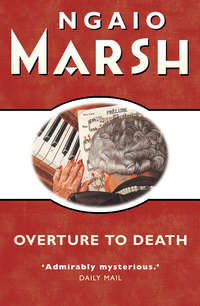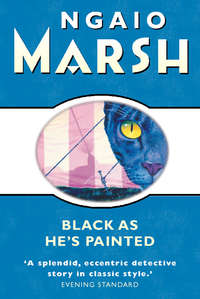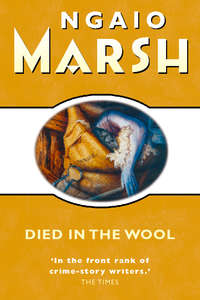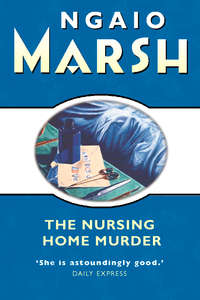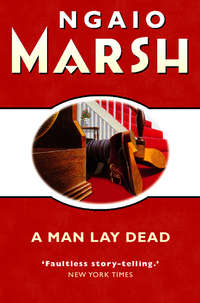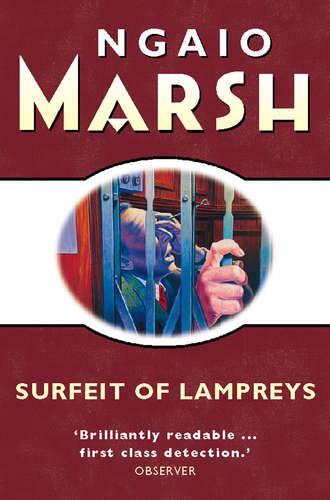
Полная версия
A Surfeit of Lampreys
‘You mean Henry.’
‘Oh, you’ll outlive me, no doubt,’ said Lord Wutherwood.
‘Then you mean me?’
‘Put it baldly, I mean the pair of you.’
There was a long pause. Roberta heard the fire in the next room settle down in the grate. She heard the breathing of the young Lampreys and the flurried ticking of a carriage-clock on the dining-room mantelpiece. When Lord Charles at last broke the silence, Roberta felt her companions stir a little as though something for which they had waited was about to appear. Lord Charles’s voice had changed. It was at once gentler and more decisive.
‘I think,’ he said, ‘that I can promise you neither Henry nor I will do much harm to Deepacres. We might possibly care to let other people share its amenities occasionally. That’s all.’
‘What do you mean?’
‘I was thinking of your regard for Deepacres and wondering if after all it amounts to very much. As you say, one day it will be Henry’s. Yet you are content to let him go down with the rest of us.’
‘If he’s got any guts he’ll make his way.’
‘I hope he will. I almost believe I am glad to go bankrupt without your aid, Gabriel. I’ve had to ask you for money. No doubt you would say I’ve come begging for money. You choose to refuse me. But please don’t plead poverty. You could perfectly well afford to help me but you are a miserly fellow and you choose not to do so. It is not a matter of principle with you, I could respect that, it is just plain reluctance to give away money. I hoped that your vanity and snobbishness, for you’re a hell of a snob, would turn the balance. I was wrong. You will go away bathed in the vapours of conscious rectitude. I doubt if you have ever in your life been guilty of a foolish generous action. Everything you have said about us is true; we have dribbled money away. But we’ve given something with it. Imogen and the children have got gaiety and warmth of heart and charm; overrated qualities perhaps, but they are generous qualities. Indeed there is nothing ungenerous about my undisciplined children. They give something to almost everybody they meet. Perhaps they cheat a little and trade a little on their charm but I don’t think that matters nearly so much as being tight-lipped monsters of behaviourism. They are full of what I dare to call loving-kindness, Gabriel, and that’s a commodity I don’t expect you to understand or applaud.’
‘Oh Daddy!’ whispered Frid.
‘That’s a damned impertinent stand to take,’ said Lord Wutherwood. ‘It’s as much as to say that people with a conscience about money are bound to be bores.’
‘Nothing of the sort, I –’
‘You’re as good as puttin’ a premium on dishonesty. It’s the way people talk these days. “Charm!” Plenty of scamps have got charm; wouldn’t be scamps if they hadn’t, I dare say. Where’s this lovin’-kindness you talk about when it comes to lettin’ down your creditors?’
‘Touché, I’m afraid,’ muttered Henry.
‘If I hadn’t thought of that,’ said Lord Charles, ‘nothing would have induced me to ask for your help.’
‘You won’t get it.’
‘Then, as I fancy the Americans say, it is just too bad about my creditors. I rather think the poor devils have banked on you, Gabriel.’
‘Insufferable impertinence!’ shouted Lord Wutherwood, and Roberta heard the angry sibilants whistle through his teeth. ‘Skulking behind my name, by God! Using my name as a screen for your dishonesty.’
‘I didn’t say so.’
‘You as good as said so,’ shouted Lord Wutherwood. ‘By God, this settles it.’
The scene which had hitherto maintained the established atmosphere of drawing-room comedy, now blossomed agreeably into the more robust type of drama. The brothers set about abusing each other in good round terms and with each intemperate sally their phrases became more deeply coloured with the tincture of Victorian rodomontade. Incredible references to wills, entails, and family escutcheons were freely exchanged. Lord Charles was the first to falter and his brother’s peroration rang out clearly.
‘I refuse to discuss the matter any further. You can drag yourself and your fool of a wife and your precious brood through the bankruptcy court. If Deepacres wasn’t entailed I’d see that you never got a penny of Lamprey money. As it is –’
‘As it is you will no doubt re-write as much of your will as is not covered by the entail.’
‘I shall do so, certainly.’
‘You’re a delightful fellow, Gabriel! I wish to God I’d left you alone.’
‘You appear even to make a failure of the noble art of sponging.’
This, as Roberta and the Lampreys afterwards agreed, was the climax. Lord Charles and his brother in unison began to speak and in a moment to shout. It was impossible to understand anything but the fact that they had both lost their tempers. This lasted for perhaps fifteen seconds and stopped so abruptly that Roberta thought of a radio knob turned off in the midst of a lively dialogue. So complete was the ensuing silence that she heard a far door open and footsteps cross the drawing-room carpet.
Mike’s voice sounded clearly: ‘Uncle Gabriel, this is a little present from all of us with our love.’
Roberta and the four Lampreys sat on the dining-room floor and gaped at each other. Next door all was silence. Lord Charles had merely said: ‘Michael, put that parcel down, will you, and come back later.’
The brothers had moved away and their following remarks were inaudible. Then Lord Wutherwood had marched out of the room, not neglecting to slam the door. Lord Charles had said: ‘Run away, Mike, old man,’ and Mike had hopped audibly to the door. Everything was quiet. Lord Charles, only a few inches away, must be standing motionless. Roberta wondered if he still looked after his brother, if he was white like Frid and Henry, or scarlet like Patch and the twins. She wished with all her heart that he would make some movement and pictured him staring with an air of blank wretchedness at the door his brother had slammed. The silence was unendurable. It was broken at last by a step in the passage outside. The dining-room door-handle rattled and Henry walked across and turned the key. The door opened and Mike stood on the threshold. He looked doubtfully at his brothers and sisters. ‘I say, is anything up?’ he asked.
‘Not much,’ said Henry.
‘Well, any way, I bet something’s up,’ Mike persisted. ‘I bet Uncle G.’s in a stink about something. He looks absolutely fed up and he and Daddy have been yelling blue murder. I say, do you know Giggle’s fixed up my Hornby train? He’s absolutely wizard with trains. I bet he could –’
‘Mike,’ said Henry. ‘Did Mummy tell you to give the pot to Uncle Gabriel?’
‘What? Oh. Well, no. You see Giggle and I were trying my Hornby in the passage and it goes absolutely whizzer now because –’
‘The pot,’ said Stephen.
‘What? Well, I saw it through Mummy’s door so I just –’
A distant voice yelled ‘Violet!’
‘Who’s that?’ asked Frid.
‘It’s Uncle G.,’ explained Mike. ‘He’s in the lift. Giggle had his coat off because he says –’
‘I’d better go to Mummy,’ said Frid. ‘She may be in difficulties with the aunts. Come on, Patch.’ They went out.
‘What is the matter with Uncle G.?’ asked Mike with casual insistence.
Stephen looked at him. ‘If you must know,’ he said violently, ‘Uncle Gabriel is –’
‘Never mind that,’ said Colin. ‘Come on out of this, Step. We need air.’
‘I think we had better go and talk to Father,’ said Henry. ‘It’s beastly to leave him alone in there. Come on you two.’
The three boys went out together. Roberta was left in the dining-room with Mike.
‘I suppose you’re not interested in Hornby trains,’ said Mike with an unconvincing air of casualness.
‘I’d like to see yours,’ said Roberta.
‘We could play with it now, of course. It’s in the passage in 26. That’s if you’d like it.’
‘Aren’t there rather a lot of people about?’ hedged Roberta lamely. ‘I mean, aunts and people.’
‘Well, of course I could bring it here. I’m allowed. Shall I, Robin? Shall I bring my Hornby in here?’
‘Yes, do.’
Mike ran to the door but there he hesitated. He looked rather a solemn pale little boy. ‘I say,’ he said, ‘as a matter of fact I think Uncle Gabriel’s pretty ghastly.’
‘Do you?’ said Roberta helplessly.
A tall figure in chauffeur’s uniform appeared in the passage behind Mike.
‘Oh, hallo, Giggle,’ cried Mike.
‘Beg pardon, Miss,’ said Giggle. ‘Beg pardon, Master Michael, but I’ve got to go. There’s that coupling – I’ve got it fixed. His lordship’s in a hurry, so if you –’
‘I’ll come with you, Giggle,’ said Mike warmly.
They disappeared together. Roberta heard Mike’s eager voice die away. ‘Violet!’ yelled the distant voice again. She heard the groan of the lift. Roberta waited.
The tick of the carriage-clock came up again. In a distant part of the flat a door banged. The lift groaned once more. Outside, far beneath the windows and reaching away for miles and miles, surged the ocean of sound which is the voice of London. People were talking, now, in the room next door: a low murmur of voices.
Roberta felt lonely and irresolute and, for the moment, isolated from the calamity that had befallen her friends. She felt that wherever she went she would be hideously in their way. Perhaps if she played trains with Mike it would be a help. Mike was taking a long time. Roberta took a cigarette from a box on the sideboard and hunted about the room for matches. At last she found some. She lit her cigarette and leant over the window-sill. She became aware of a new sound. It came up through her conscious thoughts, gaining definition and edge. It was a thin blade of sound, sharp and insistent. It grew louder. It was inside the building, an intermittent horridly shrill noise that came closer. A hand closed round Roberta’s heart. Someone was screaming.
CHAPTER 6
Catastrophe
I
When Roberta realized that this intolerable sound was on the landing, close at hand, part of the flat itself, she was filled with a strange irresolution. Someone was screaming in the Lampreys’ flat and there didn’t seem to be anything for Roberta to do about it. She was unable to feel the correct impulses and run helpfully towards the source of these unpleasing noises. No doubt the Lampreys were doing that. Roberta, with a leaping heart, could only stand and wonder at her behaviour. While she still hung off on this queer point of social procedure, someone pounded down the passage. Without conscious volition Roberta followed. She was just in time to see Baskett’s coat-tails whisk round the corner. As she passed the drawing-room Henry ran through the hall from the landing. The screaming stopped suddenly like a train whistle.
Конец ознакомительного фрагмента.
Текст предоставлен ООО «ЛитРес».
Прочитайте эту книгу целиком, купив полную легальную версию на ЛитРес.
Безопасно оплатить книгу можно банковской картой Visa, MasterCard, Maestro, со счета мобильного телефона, с платежного терминала, в салоне МТС или Связной, через PayPal, WebMoney, Яндекс.Деньги, QIWI Кошелек, бонусными картами или другим удобным Вам способом.


